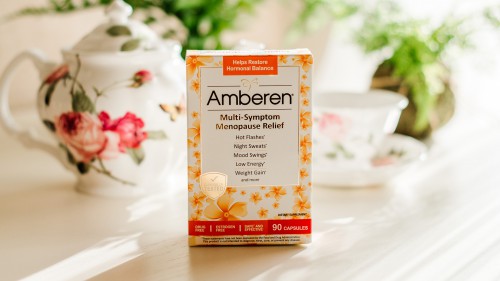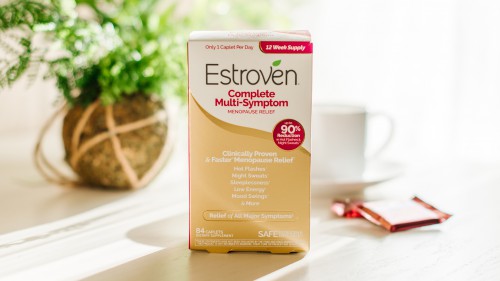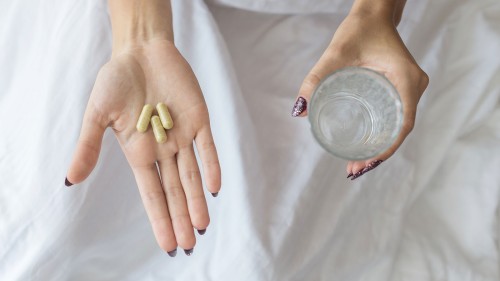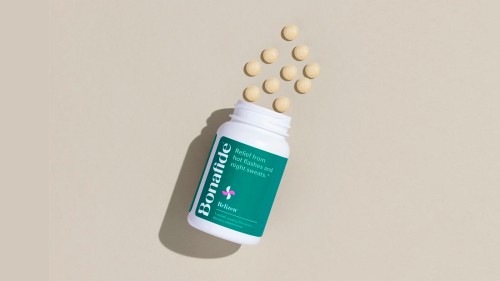11 Natural Ways to Reduce the Symptoms of Menopause
Published on August 1, 2021
Medically Reviewed by Anthony Dugarte, MD
While menopause is a normal phase of life, it can come with many uncomfortable symptoms. But there is a lot that can be done to help yourself feel better naturally.


Menopause is a natural lifecycle stage in which a woman is at the end of her menstrual cycle.
According to the World Health Organization, menopause officially starts after a woman has not had a period for 12 months.
The median age of menopause’s onset is between 50–52, though menopause may naturally occur as early as 45. (1)
Estrogen and progesterone, the primary female hormones, significantly decrease during menopause and can lead to a number of systemic changes in the body and associated symptoms. (2)
Common symptoms of menopause include:
- Hot flashes
- Night sweats
- Chills
- Vaginal dryness
- Vaginal atrophy
- Insomnia and sleep disturbances
- Slowed metabolism and weight gain
- Muscle loss
- Mood changes and depression
- Cognitive complaints
- Increased fracture risk
The current gold standard for dealing with the symptoms of menopause is hormonal replacement therapy (HRT) with estrogen.
Estrogen is known to reduce the risk of osteoporosis and cardiovascular disease and decrease the chronic symptoms that occur with menopause. (2, 3, 4)
However, there are concerns about taking estrogen to relieve menopausal symptoms.
Estrogen replacement therapy may increase the risk for cardiovascular disease or dementia in women who are either over 60 or who begin estrogen replacement more than 10 years after starting menopause. (5)
Many women choose not to start menopausal hormonal therapy with estrogen and instead prefer to treat their menopause symptoms naturally.
For those who are looking for natural ways to manage their menopause without hormonal therapy or want to find additional ways to relieve menopausal symptoms naturally, there is a lot you can do.
1. Start Doing Mind-Body Techniques
Mind-body techniques including tai chi, meditation, and yoga may help increase physical fitness and naturally improve symptoms of menopause.
Yoga is a practice that traditionally connects physical exercise, meditation, and spirituality.
Modern yoga practices may focus on physical exercise and meditation to provide physical benefits and stress relief.
In a small 2020 study, an intervention in menopausal women was conducted to see what effects informational support and yoga could have on their menopause symptoms. (6)
Women in the intervention group were new to yoga practice and participated in 60-minute yoga classes three times per week for 24 weeks while receiving information support about menopause.
At the end of the trial, women in the yoga group had improvements in depression, anxiety, sleep quality, and menopausal distress compared to the control group.
Yoga is also shown in studies to improve the physical quality of life in menopausal women and may have small, positive effects on psychological, sexual, and vasomotor symptoms (including hot flashes). (7)
A 2020 cross-sectional study found that premenopausal and postmenopausal women who regularly meditated tended to have less irritability and depressive moods present. (8)
In addition, postmenopausal women who meditated had lower blood glucose compared to those who didn’t.
However, mindfulness, meditation, and relaxation practices are not yet shown to have a significant impact on vasomotor symptoms during menopause, and more research needs to be done. (9)
Tai chi may be effective for improving the quality of life in perimenopausal women by improving bodily pain, general health, vitality, bone mineral density in the spine, and mental health. However, there are few studies on its effectiveness. (10)
Summary:
Out of popular mind-body techniques, yoga and tai chi have the potential to improve the physical quality of life in women with menopause. Meditation may help with mood-related symptoms of menopause but not with vasomotor symptoms. More research generally needs to be done on mind-body practices and their impact on relieving menopausal symptoms.
2. Try Black Cohosh Supplements
Black cohosh is a perennial flowering plant native to North America. It was traditionally used for a number of ailments in Native medicine, including the support of reproductive health in women.
Its root is used in herbal preparations, and you can find black cohosh as a tea, tincture, or in capsules.
A 2020 review and meta-analysis on a standardized black cohosh extract (RemiFemin or RemiSure) supports the use of black cohosh as a non-hormonal treatment for reducing menopause symptoms. (11)
Compared to a placebo, black cohosh decreased rated anxiety, hot flushes, sweating, vaginal atrophy symptoms, and sleep disorders.
Black cohosh was found to have similar menopause symptom relief to low-dose estrogen patches and estrogen-mimicking medications and enhanced improvement in depressive symptoms when combined with an SSRI.
Common side effects of taking black cohosh include gastrointestinal upset and rashes, which tend to be mild and short-lasting. (12)
Other potential side effects include vaginal bleeding or spotting, breast pain, breast enlargement, musculoskeletal complaints, and liver damage.
Summary:
Standardized black cohosh extracts can be an effective supplement to relieve hot flashes, vaginal atrophy symptoms, improve sleep, and help with mood, with effects potentially comparable to menopause medications.
Related: 11 Herbs and Supplements for Menopause
3. Begin Stress Management and Relaxation Techniques
Anxiety and stress can be triggers to menopausal hot flashes. Women who have somatic manifestations of anxiety (including symptoms of chest pain, dizziness, abdominal pain, and headache) may have a greater frequency of hot flashes. (13)
Techniques to promote relaxation and stress management have the potential to treat menopausal symptoms naturally.
Mindfulness-based stress reduction (MBSR) is a mindfulness training program that incorporates body scans, sitting meditation, and mindful stretching exercises.
In a 2012 randomized trial, late perimenopausal and early postmenopausal women experiencing 5 or more moderate to severe hot flashes per day were assigned either to an MBSR program or a control group on a wait-list for an MBSR program. (14)
After a 9-week MBSR program intervention and follow-up at the end of 20 weeks, women who participated in the MBSR program had improved quality of life, subjective sleep quality, reduced anxiety, reduced perceived stress, and were less bothered by hot flashes compared to the control group.
Relaxation techniques such as paced breathing and progressive muscle relaxation may help with improving mood and reducing the frequency of hot flashes.
However, current studies on relaxation techniques are small and are not of strong quality, so more research needs to be done on their effectiveness. (15)
Summary:
Mindfulness-based stress reduction and other relaxation techniques may help reduce the frequency of hot flashes and help with mood and other menopausal symptoms. However, more rigorous studies need to be done to see how effective these methods are.
4. Reduce Caffeine Intake
Caffeine is a compound found in common goods, including green tea, coffee, and chocolate.
Menopausal women who are 40 or older who used caffeine-containing beverages or products may be more likely to be bothered by symptoms like hot flashes and night sweats. (16)
Having caffeine too late in the day may also impact sleep quality.
A 2017 review found that caffeine increased the time to fall asleep, reduced total sleep time, and worsened perceived sleep quality. (17)
Researchers also found that older adults may be more sensitive to the effects of caffeine.
Intake of up to 400 mg per day of caffeine is considered safe in healthy adults, but individuals may have lower caffeine limits depending on other health conditions. (18)
Summary:
Caffeine intake is associated with hot flashes and night sweats symptoms, though there is limited evidence if cutting out caffeine will reduce these symptoms. Limiting caffeine can help improve the quality of sleep, which already can suffer from menopause-related insomnia.
Related: Healthy Alternatives to Coffee
5. Quit Smoking
Smoking is associated with an increased risk of hot flashes. The mechanism of how smoking affects hot flashes is unclear, but it is thought that smoking may decrease levels of estrogen in the body.
Research shows that quitting smoking can help you find relief from your hot flashes.
One 2015 study found that menopausal women who quit smoking were less likely to have hot flashes. (19)
And if they did have hot flashes, they were less likely to have severe or frequent hot flashes compared to the women who continued to smoke.
Summary:
Smoking is a trigger for hot flashes. However, quitting smoking can reduce hot flashes and their severity.
6. Moderate Alcohol Intake
Alcohol can be a trigger for hot flashes for some, but the research on alcohol and menopause may favor some alcohol intake.
Low to moderate consumption of alcohol, considered to be approximately one to three drinks per week, was associated with later onset of menopause compared to women who didn’t drink. (20)
Intake of at least 12 alcoholic beverages during the year was found to be associated with a shorter duration of hot flashes in a study published in 2016. (21)
Despite these potential benefits, watching your alcohol intake can be beneficial for reducing overall chronic disease risk and making sure your body can fully utilize the nutrition from your diet. (22)
Women are recommended to limit alcohol intake to 1 drink per day or less. It may not be recommended to drink alcohol depending on other medications or conditions that you may have.
A single drink is considered 12 ounces of 5% ABV (alcohol by volume) beer, 8 ounces of 7% ABV malt liquor, 5 ounces of 12% ABV wine, or 1.5 ounces of 40% ABV/80 proof distilled spirits.
Summary:
Low to moderate alcohol intake (1 to 3 drinks per week) may delay the onset of menopause and reduce the frequency of hot flashes. However, responsible alcohol intake or abstinence should be followed to reduce chronic disease risk or potential medical complications.
7. Reduce Trigger Foods
Certain foods may trigger hot flashes to occur more often. Spicy foods are commonly associated with hot flashes.
This may be because the body reacts to spicy foods in a manner similar to a hot flash – increasing body temperature and sweating.
Perimenopausal and postmenopausal women who report regularly eating hot and spicy foods were more likely to have an increased frequency of hot flashes than those who don’t. (23)
There may be additional foods that act as “triggers” to menopausal symptoms, so self-monitoring can be helpful.
If you believe that some of your symptoms may be related to certain foods, keeping a food diary of your meals and symptoms can help you identify potential trigger foods.
You can speak with your physician further about any concerns about food intolerances to get a full and individualized assessment of your condition.
Summary:
Spicy foods and other foods can trigger hot flashes. Monitor your intake with the occurrence of symptoms to see what foods trigger your symptoms.
8. Increase Omega-3s In Your Diet
Omega-3 fatty acids are a type of essential fatty acid. The main omega-3s you can get from your diet are alpha-linoleic acid (ALA), eicosapentaenoic acid (EPA), and docosahexaenoic acid (DHA).
Supplementation with omega-3 fatty acids may help with reducing hot flashes and improving depressive mood symptoms during menopause.
It may help symptoms by reducing inflammation and protecting the brain.
Intake of 1 to 2 grams of EPA and DHA daily may improve psychological distress and improve depressive symptoms, though it is not a substitute for medications. (24)
The research on whether omega-3 supplements can help hot flashes is still inconclusive, but it may help with night sweats.
Studies are inconsistent in showing whether omega-3 supplements can improve hot flashes when compared to a placebo. (25)
Though there may be limitations on how omega-3s can help some menopausal symptoms, they are still beneficial for reducing cardiovascular disease risk. (26)
Menopausal women have an increase in cardiovascular disease risk after menopause onset, so incorporating omega-3s can help keep your heart healthy. (27)
Sources of omega-3 fatty acids include seeds and seed-based oils, nuts, fish, seafood, algae, and omega-3 supplements.
Summary:
Omega-3 fatty acids may help with mood-related symptoms of menopause, but the research is inconclusive on its effects on hot flashes. In addition, these essential fatty acids may help heart health, which is important due to the increased risk of cardiovascular disease during menopause.
Related: Best Fish Oil Supplements of 2022, According to Dietitians
9. Try Red Clover Supplements
Red clover is a dark-pink perennial herb that belongs to the legume family. It is rich in isoflavones, which is a group of phytochemicals that have estrogen-like effects.
Many women have used red clover as an alternative to estrogen due to concerns about the safety and potential side effects of estrogen hormonal therapy.
A 2021 review and meta-analysis of 8 trials found that red clover was effective in reducing hot flashes in menopausal women compared to a placebo. (28)
Postmenopausal women who experienced 5 or more hot flashes per day had substantial decreases in hot flashes after supplementation, especially when supplemented with over 80 mg per day of red clover extract for at least 12 weeks.
Doses between 40 mg to 160 mg per day were used in the studies included in this meta-analysis and review.
Side effects from taking red clover are uncommon, but you can experience headaches or nausea when taking this herb.
Summary:
Red clover contains isoflavones that mimic estrogen and is effective in reducing hot flashes in postmenopausal women.
10. Follow a Healthy Postmenopausal Diet
Due to the body’s changes during menopause, women have a decrease in metabolism and are at greater risk for cardiovascular disease and osteoporosis.
Decreases in metabolic rate may require calories to be adjusted based on activity and speed of weight gain.
Though overall caloric intake may decrease, plan meals to include adequate protein to prevent accelerated losses of muscle.
In 2020, a review was published examining beneficial dietary components to manage cholesterol and triglycerides during menopause. (29)
Vitamin D, omega-3 fatty acids, fruits and vegetables, antioxidant-rich spices and tea, whole grains, probiotics, and whole foods were thought to be best to improve the quality of life during menopause.
If you’re looking for a good start to healthy eating, MyPlate recommends filling half of your plate with fruits and vegetables, a quarter of your plate with whole grains, and a quarter with lean protein foods. (30)
Accompany your meals with calcium-rich sources that meet your needs.
The Dietary Guidelines for Americans 2020–2025 recommends a variety of nutrient-dense foods and beverages that reflect your personal preferences and cultural traditions. (31)
Summary:
Eating a healthy, nutrient-dense diet composed mostly of whole foods that can provide adequate vitamins, antioxidants and probiotics can be beneficial to help with menopause symptoms naturally.
11. Use Aromatherapy
Everyone enjoys smelling nice things. Lucky for us, aromatherapy may be an easy and natural method to reduce menopause symptoms.
In a 2016 clinical trial, 100 menopausal women between the ages of 45 to 55 years of age were assigned to either smell a lavender aroma or diluted milk for 20 minutes twice per day, over a 12-week period. (32)
At the end of the study, women who smelled the lavender had a significant decrease in the number of hot flashes they experienced compared to a placebo.
Smelling lavender essential oil may have a small, though insignificant, effect on reducing the time spent awake in the middle of the night after initially falling asleep. (33)
Aromatherapy combined with massage may be more beneficial than massage alone or placebo in reducing vasomotor symptoms and symptoms of depression. (15)
Summary:
Aromatherapy and lavender essential oils may reduce hot flashes, improve mood, and could potentially help sleep quality.
The Bottom Line
While menopause is a natural time of transition, symptoms can be uncomfortable and life-altering.
Many of these natural therapies can help but should be used alongside traditional medical treatments or hormone management.
Always speak to your doctor first to prevent a delay in treatment or to ensure you are doing the best things for your health.
At WellnessVerge, we only use reputable sources, including peer-reviewed medical journals and well-respected academic institutions.
- The Timing of the Age at Which Natural Menopause Occurs:
https://www.ncbi.nlm.nih.gov/pmc/articles/PMC3285482/ - Menopausal Symptoms and Their Management:
https://www.ncbi.nlm.nih.gov/pmc/articles/PMC4890704/ - Estrogen therapy for osteoporosis in the modern era:
https://pubmed.ncbi.nlm.nih.gov/29520604/ - Cardiovascular health and the menopausal woman: the role of estrogen and when to begin and end hormone treatment:
https://pubmed.ncbi.nlm.nih.gov/31543950/ - The History of Estrogen Therapy:
https://www.ncbi.nlm.nih.gov/pmc/articles/PMC7334883/ - Effect of the Information Support Method Combined with Yoga Exercise on the Depression, Anxiety, and Sleep Quality of Menopausal Women:
https://pubmed.ncbi.nlm.nih.gov/33370736/ - Exercise and Quality of Life in Women with Menopausal Symptoms: A Systematic Review and Meta-Analysis of Randomized Controlled Trials:
https://pubmed.ncbi.nlm.nih.gov/32993147/ - A potential association of meditation with menopausal symptoms and blood chemistry in healthy women: A pilot cross-sectional study:
https://pubmed.ncbi.nlm.nih.gov/32899065/ - Use of mindfulness, meditation and relaxation to treat vasomotor symptoms:
https://pubmed.ncbi.nlm.nih.gov/28286985/ - Tai Chi Exercise for the Quality of Life in a Perimenopausal Women Organization: A Systematic Review:
https://pubmed.ncbi.nlm.nih.gov/28742289/ - Review & meta-analysis: isopropanolic black cohosh extract iCR for menopausal symptoms - an update on the evidence:
https://pubmed.ncbi.nlm.nih.gov/33021111/ - Black Cohosh Fact Sheet for Health Professionals:
https://ods.od.nih.gov/factsheets/BlackCohosh-HealthProfessional/ - Anxiety as a risk factor for menopausal hot flashes: evidence from the Penn Ovarian Aging cohort:
https://pubmed.ncbi.nlm.nih.gov/27433864/ - Mindfulness Training for Coping with Hot Flashes: Results of a Randomized Trial:
https://www.ncbi.nlm.nih.gov/pmc/articles/PMC3123409/ - Complementary and Alternative Medicine for Menopause:
https://www.ncbi.nlm.nih.gov/pmc/articles/PMC6419242/ - Caffeine and menopausal symptoms: what is the association?:
https://pubmed.ncbi.nlm.nih.gov/25051286/ - Coffee, caffeine, and sleep: A systematic review of epidemiological studies and randomized controlled trials:
https://pubmed.ncbi.nlm.nih.gov/26899133/ - The Safety of Ingested Caffeine: A Comprehensive Review:
https://www.ncbi.nlm.nih.gov/pmc/articles/PMC5445139/ - Does quitting smoking decrease the risk of midlife hot flashes? A longitudinal analysis:
https://www.ncbi.nlm.nih.gov/pmc/articles/PMC4546860/ - Association of alcohol consumption with the onset of natural menopause: a systematic review and meta-analysis:
https://academic.oup.com/humupd/article/22/4/516/2573866 - Risk Factors for Extended Duration and Timing of Peak Severity of Hot Flashes:
https://journals.plos.org/plosone/article?id=10.1371/journal.pone.0155079 - The Risks Associated With Alcohol Use and Alcoholism:
https://www.ncbi.nlm.nih.gov/pmc/articles/PMC3307043/ - The International Menopause Study of Climate, Altitude, Temperature (IMS-CAT) and vasomotor symptoms:
https://pubmed.ncbi.nlm.nih.gov/22946508/ - N-3 Polyunsatured Fatty Acids in Menopausal Transition: A Systematic Review of Depressive and Cognitive Disorders with Accompanying Vasomotor Symptoms:
https://www.ncbi.nlm.nih.gov/pmc/articles/PMC6073395/ - Effect of omega-3 supplements on vasomotor symptoms in menopausal women: A systematic review and meta-analysis:
https://pubmed.ncbi.nlm.nih.gov/30056356/ - Omega-3 fatty acids in coronary heart disease: Recent updates and future perspectives:
https://pubmed.ncbi.nlm.nih.gov/30230571/ - Menopause Transition and Cardiovascular Disease Risk: Implications for Timing of Early Prevention: A Scientific Statement From the American Heart Association:
https://www.ahajournals.org/doi/10.1161/CIR.0000000000000912 - Evaluation of Clinical Meaningfulness of Red Clover ( Trifolium pratense L.) Extract to Relieve Hot Flushes and Menopausal Symptoms in Peri- and Post-Menopausal Women: A Systematic Review and Meta-Analysis of Randomized Controlled Trials:
https://pubmed.ncbi.nlm.nih.gov/33920485/ - Menopause-Associated Lipid Metabolic Disorders and Foods Beneficial for Postmenopausal Women:
https://www.ncbi.nlm.nih.gov/pmc/articles/PMC7019719/ - MyPlate:
https://www.myplate.gov/ - Dietary Guidelines for Americans:
https://www.dietaryguidelines.gov/ - Effect of lavender aromatherapy on menopause hot flushing: A crossover randomized clinical trial:
https://www.sciencedirect.com/science/article/pii/S172649011630082X - Lavender essential oil on postmenopausal women with insomnia: Double-blind randomized trial:
https://pubmed.ncbi.nlm.nih.gov/33905827/






